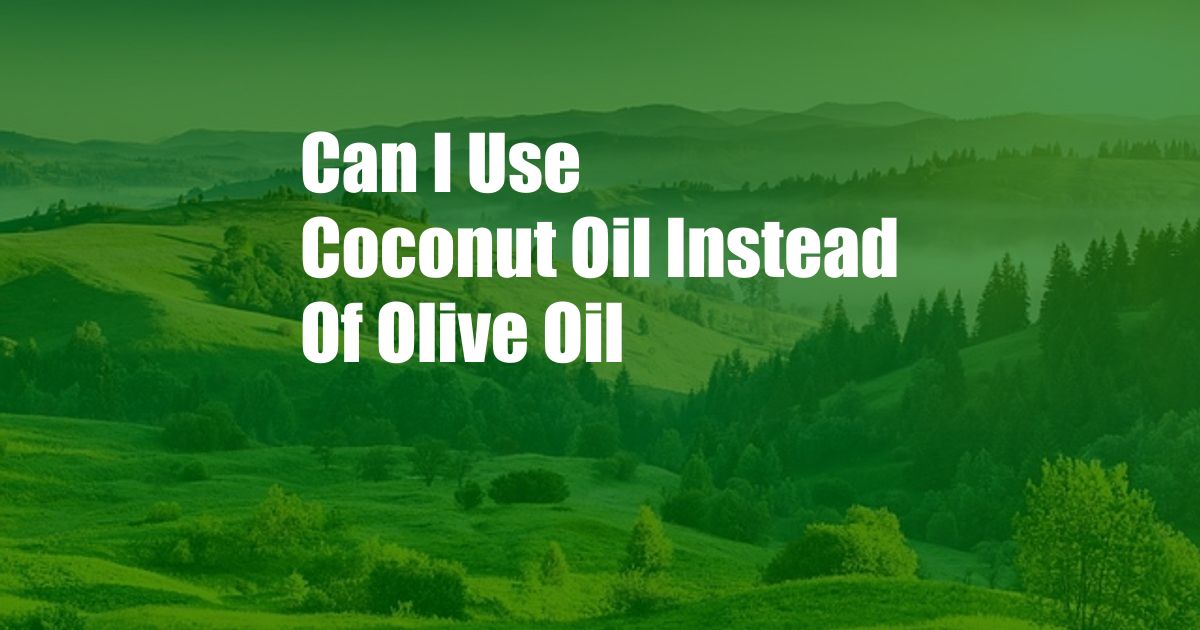
Can I Use Coconut Oil Instead of Olive Oil?
In my quest to live a healthier lifestyle, I’ve become more conscious of the foods I eat and the ingredients I use. One of the key changes I’ve made is replacing butter with healthier fats, such as olive oil and coconut oil. But when I ran out of olive oil recently, I wondered if I could substitute it with coconut oil in my cooking. To my surprise, the answer is not a simple yes or no.
Coconut oil and olive oil have distinct properties and uses, so whether or not you can use one as a substitute for the other depends on the specific application. Let’s delve into the fascinating world of these two oils and explore their differences, similarities, and the best scenarios for using each one.
Understanding Coconut Oil
Coconut oil is extracted from the meat of mature coconuts. It has a high smoke point, which makes it suitable for high-temperature cooking methods such as frying and sautéing. Coconut oil also has a solid form at room temperature, but it melts quickly when heated.
Due to its high saturated fat content, coconut oil has been the subject of some debate regarding its health benefits. Some studies have shown that coconut oil can raise HDL (good) cholesterol while lowering LDL (bad) cholesterol. However, it’s important to note that it also contains saturated fat, which should be consumed in moderation.
Understanding Olive Oil
Olive oil, on the other hand, is extracted from pressed olives. It’s a monounsaturated fat, which means it contains a type of fat that is considered beneficial for heart health. Olive oil has a lower smoke point than coconut oil, making it more suitable for low-temperature cooking methods such as salad dressings, marinades, and drizzling over finished dishes.
Olive oil is rich in antioxidants, which help protect against cell damage and reduce the risk of chronic diseases. It also contains oleic acid, a fatty acid that has been linked to anti-inflammatory effects.
Tips and Expert Advice
When it comes to substituting coconut oil for olive oil, here are some tips from culinary experts:
**Consider the Flavor:** Coconut oil has a distinctive flavor that may not complement all dishes. It’s best suited for recipes where the coconut flavor will enhance the dish, such as Asian or tropical cuisine.
**Be Mindful of the Heat:** Coconut oil’s high smoke point makes it ideal for high-heat cooking. However, if you’re cooking at lower temperatures, such as when making salad dressings or marinating, use olive oil instead.
**Keep Health in Mind:** Coconut oil’s high saturated fat content should be taken into consideration when using it in large quantities. While moderate consumption may provide some health benefits, it’s important to focus on a balanced diet that includes a variety of healthy fats.
FAQ
**Q: Is coconut oil healthier than olive oil?**
A: Both coconut oil and olive oil have their own unique health benefits. Coconut oil contains medium-chain triglycerides, which may have some metabolic advantages, while olive oil is rich in monounsaturated fats, which are beneficial for heart health. It’s best to include both oils in moderation as part of a balanced diet.
**Q: Can I use coconut oil in all my cooking?**
A: While coconut oil can be used in a variety of cooking methods, it’s not a perfect substitute for olive oil in all applications. Due to its distinct flavor and high smoke point, it’s best to choose the oil that best suits the specific dish you’re preparing.
Conclusion
Understanding the differences between coconut oil and olive oil is key to using them effectively in your cooking. While both oils offer health benefits, their distinct properties make them suitable for different applications. By considering the flavor, heat level, and health implications, you can make informed decisions about which oil to use, enhancing both the taste and nutritional value of your dishes.
So, the next time you’re wondering whether to reach for the coconut oil or the olive oil, remember the tips and insights provided in this article. Are you interested in learning more about the fascinating world of cooking oils? Let us know in the comments below, and we’ll be happy to delve deeper into the topic.